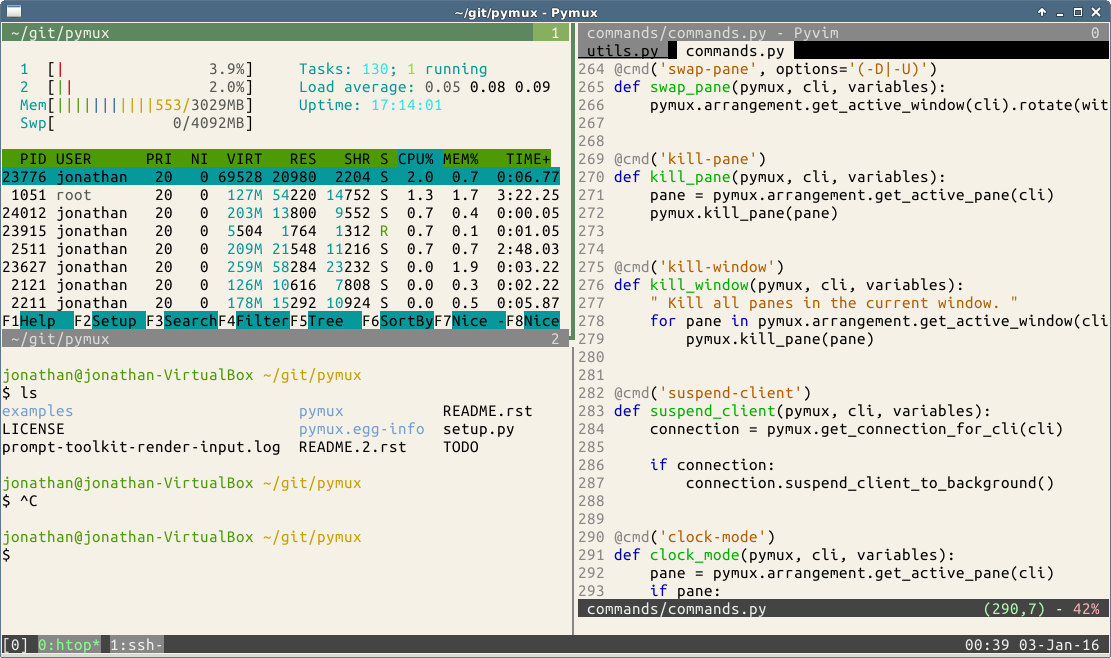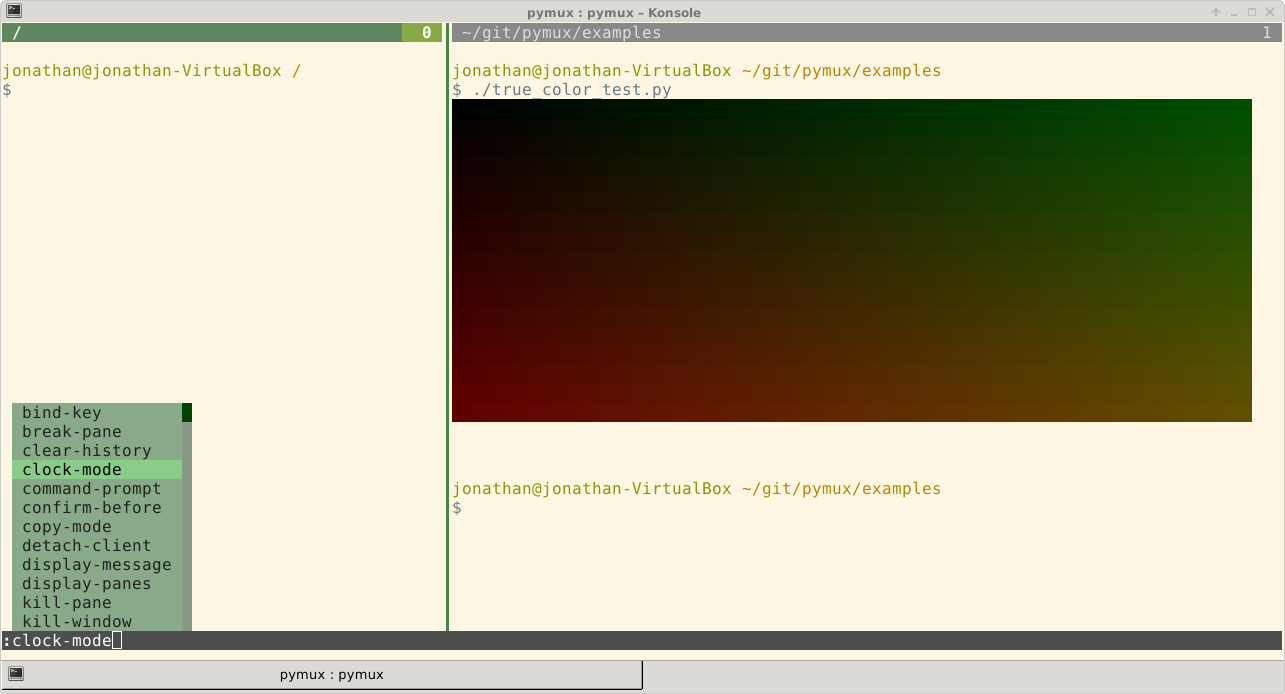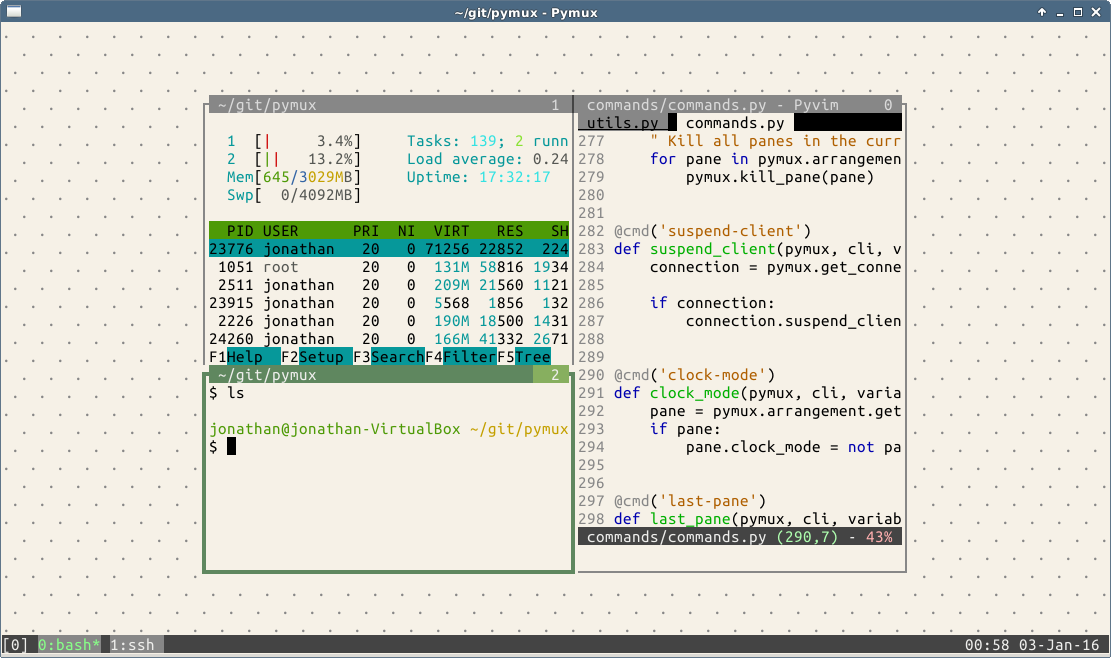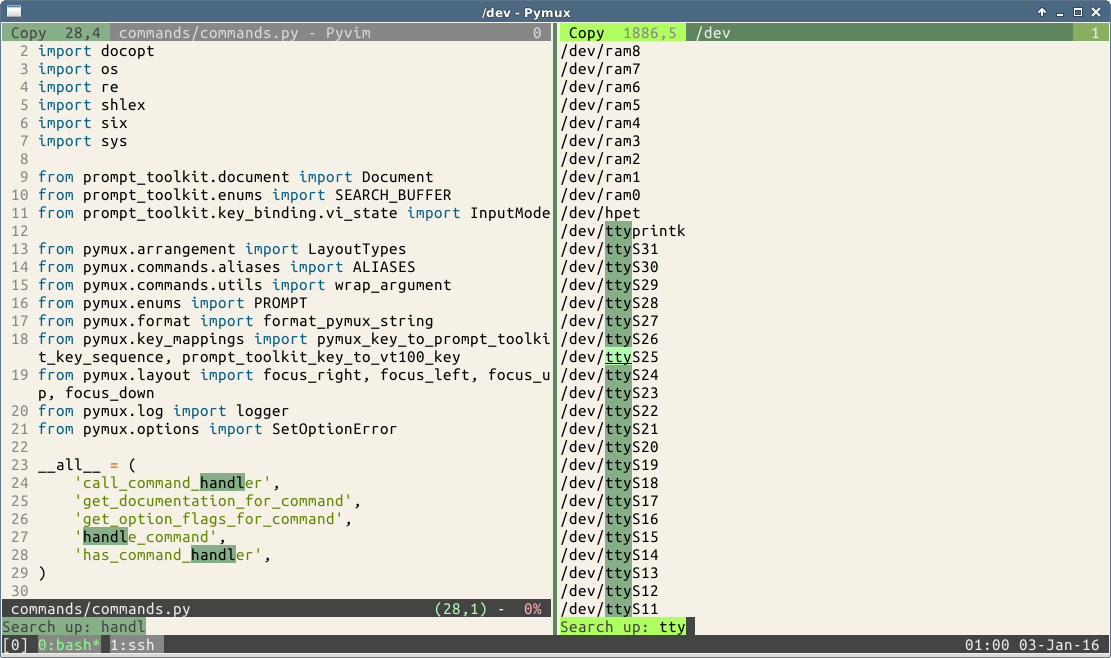A terminal multiplexer (like tmux) in Python
pip install pymux
Issues, questions, wishes, comments, feedback, remarks? Please create a GitHub issue, I appreciate it.
Simply install pymux using pip:
pip install pymux
Start it by typing pymux.
A terminal multiplexer makes it possible to run multiple applications in the same terminal. It does this by emulating a vt100 terminal for each application. There are serveral programs doing this. The most famous are GNU Screen and tmux.
Pymux is written entirely in Python. It doesn't need any C extension. It runs on all Python versions from 2.6 until 3.5. It should work on OS X and Linux.
To some extent, pymux is a clone of tmux. This means that all the default shortcuts are the same; the commands are the same or very similar, and even a simple configuration file could be the same. (There are some small incompatibilities.) However, we definitely don't intend to create a fully compatible clone. Right now, only a subset of the command options that tmux provides are supported.
Pymux implements a few improvements over tmux:
- There is a completion menu for the command line. (At the bottom of the screen.)
- The command line has fish-style suggestions.
- Both Emacs and Vi key bindings for the command line and copy buffer are well developed, thanks to all the effort we have put earlier in prompt_toolkit.
- Search in the copy buffer is highlighted while searching.
- Every pane has its own titlebar.
- When several clients are attached to the same session, each client can watch a different window. When clients are watching different windows, every client uses the full terminal size.
- Support for 24bit true color. (Disabled by default: not all terminals support
it. Use the
--truecoloroption at startup or during attach in order to enable it.) - Support for unicode input and output. Pymux correctly understands utf-8 encoded double width characters. (Also for the titlebars.)
About the performance:
- Tmux is written in C, which is obviously faster than Python. This is
noticeable when applications generate a lot of output. Where tmux is able to
give fast real-time output for, for instance
find /oryes, pymux will process the output slightly slower, and in this case render the output only a few times per second to the terminal. Usually, this should not be an issue. If it is, Pypy should provide a significant speedup.
The big advantage of using Python and prompt_toolkit is that the implementation of new features becomes very easy.
24 bit color support and the autocompletion menu:
What happens if another client with a smaller screen size attaches:
When a pane enters copy mode, search results are highlighted:
For several reasons. Having a terminal multiplexer in Python makes it easy to experiment and implement new features. While C is a good language, it's not as easy to develop as Python.
Just like pyvim (A Vi clone
in Python.), it started as another experiment. A project to challenge the
design of prompt_toolkit. At this point, however, pymux should be stable and
usable for daily work.
The development resulted in many improvements in prompt_toolkit, especially performance improvements, but also some functionality improvements.
Further, the development is especially interesting, because it touches so many different areas that are unknown to most Python developers. It also proves that Python is a good tool to create terminal applications.
There is no official roadmap, the code is mostly written for the fun and of course, time is limited, but I use pymux professionally and I'm eager to implement new ideas.
Some ideas:
- Support for color schemes.
- Support for extensions written in Python.
- Better support for scripting. (Right now, it's already possible to run pymux
commands from inside the shell of a pane. E.g.
pymux split-window. However, status codes and feedback aren't transferred yet.) - Improved mouse support. (Reporting of mouse movement.)
- Parts of pymux could become a library, so that any prompt_toolkit application can embed a vt100 terminal. (Imagine a terminal emulator embedded in pyvim.)
- Maybe some cool widgets to traverse the windows and panes.
- Better autocompletion.
Create a file ~/.pymux.conf, and populate it with commands, like you can
enter at the command line. There is an example config
in the examples directory.
If for some reason pymux crashes, it will attempt to write a stack trace to a
file with a name like /tmp/pymux.crash-*. It is possible that the user
interface freezes. Please create a GitHub issue with this stack trace.
- Pyte, for providing a working vt100 parser. (This one is extended in order to support some xterm extensions.)
- docopt, for parsing the command line arguments.
- prompt_toolkit, for the UI toolkit.
- wcwidth: for better unicode support (support of double width characters).
- tmux, for the inspiration.



